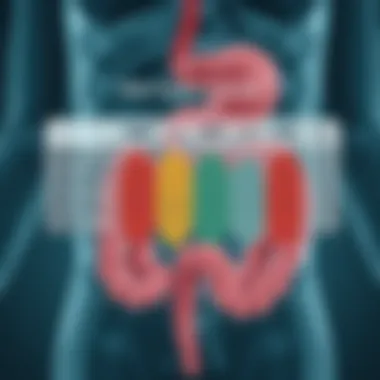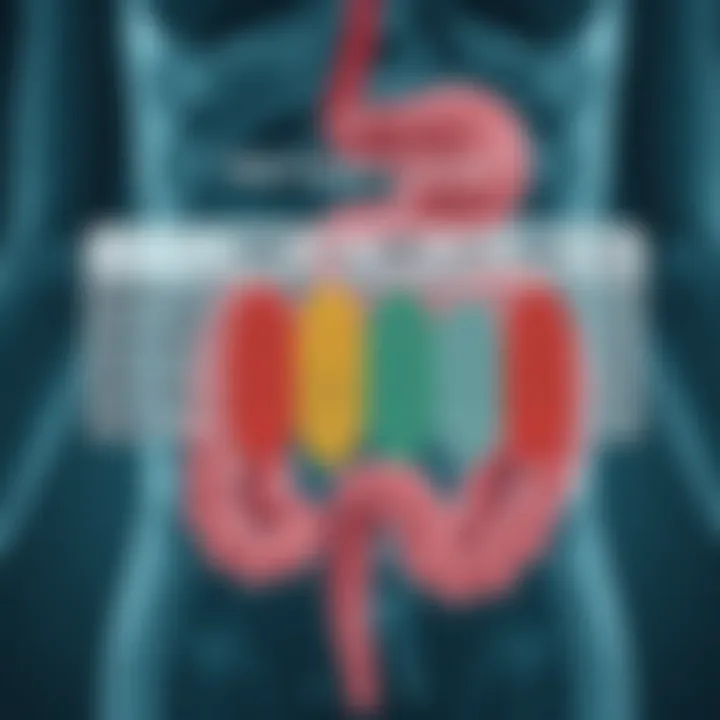How to Effectively Detect Bowel Cancer Early


Article Overview
Purpose of the Article
Bowel cancer, a growing concern in public health, often lurks in the shadows, manifesting subtle symptoms that many ignore. The purpose of this article is to shed light on the importance of early detection and screening methods. By equipping readers with knowledge about risk factors, symptoms, and available diagnostic tests, the aim is to foster a proactive approach to health management. Regular screening can significantly reduce the risks associated with late-stage diagnosis, making this information essential for every individual.
Relevance to Multiple Disciplines
This topic crosses various disciplines - from medicine and nursing to public health and education. Healthcare professionals need to stay informed about the latest screening techniques and associated guidelines. Educators can better teach about preventive health measures when they have comprehensive data at hand. Likewise, researchers may find value in gaps in current knowledge regarding bowel cancer awareness and detection methods. Whether one is a student pursuing a health-related field or a seasoned professional, understanding bowel cancer detection is vital.
Research Background
Historical Context
The evolution of bowel cancer research has been substantial over the decades. The first major strides in identifying the disease came in the mid-20th century, with increasing awareness of the symptoms and better diagnostic tools. Initially seen as a death sentence, improvements in treatment and early detection have led to better outcomes for patients. Organizations began implementing routine screenings, making a significant impact on early detection rates. Over time, guidelines have been updated based on emerging research, leading us to today’s more informed approaches.
Key Concepts and Definitions
Understanding bowel cancer begins with grasping some key terms and concepts. Bowel cancer, also referred to as colorectal cancer, originates in the colon or rectum. Risk factors include age, family history, and lifestyle choices. Symptoms can range from changes in bowel habits to unexplained weight loss. Regular screening tests such as colonoscopy, fecal occult blood tests, and flexible sigmoidoscopy play crucial roles in early detection. Recognizing these terms is foundational in navigating discussions on bowel cancer and prevention.
Understanding Bowel Cancer
Bowel cancer is a blanket term used to describe cancers arising in the bowel, a critical component of the digestive system. Understanding this condition is vital for early detection and treatment, which significantly boosts survival odds. Grasping the nuances of bowel cancer can help individuals recognize potential risks and engage in proactive health monitoring, ultimately leading to timely intervention and better outcomes.
Definition and Importance
Bowel cancer primarily affects the large intestine, which includes the colon and rectum. Its significance lies not just in its prevalence but also in its potential for prevention. Being informed about the disease can lead to enhanced awareness, especially for those susceptible due to genetic factors or lifestyle choices. A proactive approach toward understanding bowel cancer can encourage regular screenings, allowing for early diagnosis and increasing the chances of successful treatment.
Types of Bowel Cancer
Bowel cancer isn't just a single entity; it encompasses various types that stem from different cells within the bowel. Addressing these types helps delineate their characteristics and impacts.
Colorectal Cancer
Colorectal cancer is the most commonly diagnosed type of bowel cancer. This cancer specifically affects the colon and the rectum, making it crucial in discussions around bowel health. Its popularity in this discourse stems from the alarming statistics surrounding incidence rates across demographics. What sets colorectal cancer apart is that it often develops from polyps—small growths that can be benign initially but may transform into malignant tumors over time. Early removal of these polyps during screenings can significantly lower risk and improve survival rates.
Rectal Cancer
Rectal cancer, as the name implies, is located specifically in the rectum. This type of cancer forms in the lining of the rectum and is closely related to colorectal cancer, but it has unique characteristics. One distinguishing factor is the treatment approach, which may include surgery, radiation therapy, or a combination of both, depending on the stage at diagnosis. Recognizing this variant helps individuals realize that despite similarities, nuances in location can affect the tactics used in prevention and treatment.
Adenocarcinoma
Adenocarcinoma is the most prevalent type of bowel cancer, originating in glandular tissues. While it can occur in various parts of the body, when it comes to the bowel, its implications are serious. This type of cancer often leads to symptoms that prompt individuals to seek help, making it vital to understand its existence in bowel cancer discussions. A characteristic that tips off specialists is its biological behavior, which can aid in tailoring treatment strategies appropriately, further emphasizing the importance of awareness in early detection.
Global Statistics and Trends
The landscape of bowel cancer is changing across the globe, with statistics showing a mix of rising and declining trends. In some countries, particularly those with aging populations and changes in dietary habits, the incidence of bowel cancer is on the rise. Conversely, regions with robust screening programs experience declining rates. The trends highlight the importance of incorporating awareness and education into public health strategies. Ultimately, understanding these statistics not just informs individuals but guides healthcare policies and initiatives aimed at combating bowel cancer more effectively.
Identifying Risk Factors
Identifying the risk factors associated with bowel cancer is vital for early detection and prevention. Understanding these elements not only empowers individuals to make informed lifestyle choices but also enhances their vigilance regarding potential symptoms or warning signs. Certain factors can increase susceptibility, and recognizing them helps in tailoring screening approaches and interventions. More importantly, knowledge equips individuals to consult healthcare providers proactively, ultimately working towards reducing mortality rates linked to bowel cancer.
Genetic Factors
Genetic predisposition plays a significant role in bowel cancer incidence. Some hereditary syndromes, such as Lynch syndrome and familial adenomatous polyposis, drastically increase the likelihood of developing the disease. Individuals with a family history of bowel cancer may possess mutations in genes that regulate cell growth and division. Testing for these inherited genes helps identify at-risk individuals, thus allowing for tailored surveillance strategies. Further, knowing your genetic background encourages a more personalized approach in discussions with healthcare professionals regarding screening and preventive measures.
Lifestyle Influences
When it comes to lifestyle influences on bowel cancer, several key elements come into play.
Dietary Contributions
Dietary contributions significantly affect bowel cancer risk. A diet high in red and processed meats is often associated with a greater likelihood of developing this type of cancer, while a robust intake of fruits, vegetables, and whole grains appears to reduce risk. The high fiber content in these foods not only aids digestion but can also promote a healthy gut microbiome. An essential feature of dietary choices is moderation and balance. Excessive consumption of unhealthy fats and sugar can lead to obesity, a known risk factor for bowel cancer. Thus, achieving a balanced diet emerges as a beneficial choice for mitigating such risks.
Physical Activity Levels
Physical activity levels contribute notably to an individual’s overall health, with implications for bowel cancer risk. Regular exercise has been shown to help maintain a healthy weight, reducing obesity-related risks significantly. Moreover, an active lifestyle enhances gut motility, potentially lowering the amount of time waste spends in the colon. The unique advantage of incorporating physical activity into one’s daily routine is its multifaceted nature; beyond decreasing cancer risk, it promotes general well-being. The flip side is, of course, the lifestyle inertia many face today. With sedentary behavior increasingly becoming a norm, awareness and motivation for physical activity become crucial to improving cancer prevention outcomes.
Tobacco and Alcohol Use
Tobacco and alcohol use are noteworthy lifestyle factors influencing bowel cancer risk. Smoking is a known carcinogen; it can initiate and promote cancer cell growth in various parts of the body, including the bowel. Additionally, heavy alcohol consumption is linked to increased rates of bowel cancer. Moderation is key. Limiting tobacco use and keeping alcohol intake within recommended guidelines may contribute to reducing the risk of developing related diseases. Furthermore, maintaining open conversations regarding these habits with healthcare professionals ensures support and guidance in making healthier choices.
Age and Gender Considerations
When it comes to age and gender considerations, they serve as foundational components in understanding bowel cancer risk. Research indicates that individuals over 50 are at a heightened risk for developing bowel cancer, with the condition being more prevalent among men. However, awareness is crucial for younger individuals as well since they can also be susceptible. Recognizing these demographics can encourage timely screening, aligning healthcare strategies to address the specific needs of different populations effectively. As the prevalence continues to shift, they emphasize the need for awareness and education among all ages.
Recognizing Early Symptoms
Recognizing early symptoms of bowel cancer is crucial, as it can significantly impact the chances of successful treatment. Many individuals may not put much thought into their bowel habits or the changes in their body until something seems off. However, paying attention to these early signs can mean the difference between a routine check-up and a critical intervention. This section is designed to sharpen your awareness regarding a few key indicators that may suggest a need for immediate medical evaluation, helping to empower individuals to act before symptoms develop into something more serious.
Common Symptoms to Monitor
Monitoring specific symptoms can provide valuable insight into your health. These symptoms may seem subtle, but they are essential to recognizing potential problems early on.
Changes in Bowel Habits
Changes in bowel habits can be one of the first signs of bowel issues, including cancer. This might include frequent diarrhea or constipation, or finding you have different patterns than what is normal for you. Such changes can contribute to early detection of bowel cancer by prompting further investigation. The key characteristic of this symptom is its variability; if you notice a shift away from your typical routine—especially if it lasts for more than a couple of weeks—it's a good reason to schedule a visit with your doctor.


This symptom is a beneficial indicator for this article because it is often overlooked. Many people might dismiss changes as just a result of dietary changes or stress. The unique feature of recognizing such changes lies in understanding what is normal for your body. Moreover, keeping a diary of these changes can help you communicate effectively with healthcare professionals. On the downside, not everyone may feel comfortable discussing bowel movements, leading to potentially serious delays in diagnosis.
Unexplained Weight Loss
Unexplained weight loss is another concerning symptom that could indicate the presence of bowel cancer. If you're losing weight without trying—be it through diet or increased physical activity—it raises flags. The key characteristic is that this weight loss is unexplained; it happens when you're not consciously making an effort to shed pounds. This is a popular topic for discussion in health circles, as weight loss often connects to various medical conditions beyond bowel cancer, presenting it as a multifaceted issue in diagnosis.
The unique aspect of unexplained weight loss in the context of bowel cancer is that it may result from the body not absorbing nutrients properly due to tumors. The advantage of recognizing this symptom is that it can lead individuals to seek immediate medical attention, thus potentially catching cancer at an early stage. However, the disadvantage lies in that it can often be mistaken for lifestyle changes or other health issues, which may delay necessary action.
Blood in Stool
Finding blood in your stool is perhaps one of the most alarming symptoms one could encounter and should never be ignored. Even small amounts of blood can signal serious underlying issues, including bowel cancer. The key characteristic of this symptom is its stark visibility; it can be bright red or darker depending on where the bleeding originates, and it might accompany bowel movements or appear separately.
This symptom is a beneficial choice for this article due to its direct link with potentially severe conditions. The unique feature of blood in stool is that it is often a clear signal to seek medical attention without hesitation, providing a crucial entry point for diagnosis. The main advantage of this symptom is that it often prompts quicker reactions, whereas worrying about changes in bowel habits may not trigger the same response. However, the disadvantage is that some may mistake it for hemorrhoids or assume innocent explanations without consulting professionals.
When to Consult a Doctor
It is always wise to seek medical advice when experiencing any of these symptoms. But knowing the right time to consult your doctor can make a world of difference in health outcomes. It’s essential to consult a healthcare provider if:
- You notice persistent changes in your bowel habits that last longer than two weeks.
- You experience unexplained weight loss that is significant (5% of body weight or more) during a short span of time (less than six months).
- You find blood in your stool, even if it’s just a small amount.
By understanding these early symptoms and recognizing when they warrant medical attention, you can take proactive steps towards maintaining your health. Taking these symptoms seriously could lead to early detection and increase your chances for a successful outcome.
Screening Methods
Screening methods play a vital role in catching bowel cancer at an early stage, where treatment can be most effective. They serve as preventive measures, allowing individuals to detect any signs of cancer before symptoms even arise. Recognizing that bowel cancer can often go unnoticed until it reaches a more advanced stage underscores the significance of regular screenings. In many cases, these techniques can identify precancerous growths, thus enabling interventions that can dramatically alter the course of the disease.
Regular screenings are essential, especially for those considered at risk, including individuals aged fifty and older or those with a family history of bowel cancer. In addition to identifying potential issues, screenings can also relieve anxiety by providing clarity about one's health status.
Overview of Screening Techniques
There are several methods used to screen for bowel cancer, each with their unique procedures and scopes. The most common include the Fecal Occult Blood Test (FOBT), colonoscopy, and flexible sigmoidoscopy. Each of these methods has specific indications, benefits, and sometimes drawbacks, which are important to understand.
- Fecal Occult Blood Test (FOBT): A test that checks for hidden blood in the stool. It can provide an early warning sign of potential bowel cancer.
- Colonoscopy: This is a more invasive procedure where a doctor examines the entire colon and rectum using a flexible tube. It is generally considered the gold standard in detecting bowel abnormalities.
- Flexible Sigmoidoscopy: This procedure is less comprehensive than a colonoscopy but provides valuable information about the lower part of the colon.
Choosing the right screening test often depends on individual health factors and personal preferences. Discussing these options with a healthcare provider can help determine the most appropriate choice for each person.
Fecal Occult Blood Test (FOBT)
The Fecal Occult Blood Test is a simple, non-invasive screening method that examines stool samples for hidden blood, which can indicate the presence of cancer or polyps. This test is typically performed at home, requiring individuals to collect samples and send them to a laboratory for analysis.
Advantages of the FOBT include:
- Easy to Administer: Individuals can carry out the test in the comfort of their home.
- Quick Results: Results usually come back within a few weeks, providing a timely assessment.
However, it's crucial to remember that a positive FOBT does not definitively indicate cancer. It may also detect blood from conditions such as ulcers or hemorrhoids, which necessitates further investigation.
Colonoscopy: Comprehensive Examination
Colonoscopy is often viewed as the gold standard in bowel cancer screening. This procedure involves the insertion of a long, flexible tube equipped with a camera into the rectum. The doctor examines the entire colon, allowing for the detection of polyps or abnormal growths that could potentially become cancerous.
Importance of colonoscopy includes:
- Thorough Examination: It offers a clear view of the colon, facilitating the identification and removal of polyps during the same procedure.
- Preventive Capability: If polyps are found, they can often be removed right away, greatly reducing the chances of developing cancer.
The preparation for a colonoscopy may involve dietary restrictions and bowel cleansing, which can be uncomfortable but are critical for a successful examination.
Flexible Sigmoidoscopy Procedures
Flexible sigmoidoscopy is a minimally invasive procedure focusing on the lower part of the colon, specifically the sigmoid colon and rectum. While it is not as comprehensive as a colonoscopy, it is still useful for detecting early signs of cancer in the rectum and lower colon.
The benefits include:
- Less Preparation: Typically, patients don't need to undergo the extensive bowel prep required for a colonoscopy.
- Quick Procedure: It often requires less time than a full colonoscopy and can be done in a doctor's office.
However, it’s worth noting that flexible sigmoidoscopy only covers part of the colon. Therefore, if abnormalities are detected, a follow-up colonoscopy may be recommended for a complete evaluation.
In summary, understanding and utilizing various screening methods is essential in the fight against bowel cancer. Making informed choices about these tests can lead to better health outcomes.
In summary, understanding and utilizing various screening methods is essential in the fight against bowel cancer. Making informed choices about these tests can lead to better health outcomes.
Diagnostic Imaging Techniques
Diagnostic imaging techniques play a critical role in identifying and assessing bowel cancer. These methods allow healthcare professionals to visualize the internal structures of the body, enabling them to spot abnormalities that could indicate cancer or other health issues. By employing these technologies, medical practitioners can not only detect the presence of tumors but also gauge their size, location, and whether they have spread to nearby lymph nodes or other organs. This information is vital in determining appropriate treatment plans.
The choice of imaging technique can vary based on several considerations, including the patient's condition, the types of symptoms they present, and personal medical history. The advancements in imaging technologies have also improved accuracy and reduced patient discomfort, cementing these methods as fundamental components of diagnostics in bowel cancer cases.
"Imaging techniques can be the first line of defense in catching bowel cancer early, when it’s most treatable."
"Imaging techniques can be the first line of defense in catching bowel cancer early, when it’s most treatable."
CT Scans and MRI
CT (Computed Tomography) scans and MRI (Magnetic Resonance Imaging) are widely used imaging techniques that provide detailed images of the abdomen and pelvis, areas typically affected by bowel cancer.
CT Scans
CT scans utilize X-rays to produce cross-sectional images of the body. They are particularly helpful for quickly visualizing tumors and assessing their potential spread to other organs. Some benefits of CT scans include:
- Rapid results: CT scans can produce images in just a few minutes, which is essential in urgent situations.
- Comprehensive visualization: This method allows for a detailed view of the bowel and adjacent structures, making it easier to see the extent of cancer.


However, it’s important to note that CT scans involve exposure to radiation. Patients must discuss the risks and benefits with their doctors, especially if they require multiple scans over time.
MRI
MRI, on the other hand, uses strong magnets and radio waves to create detailed images, which can be particularly useful in assessing soft tissues. Here are a few points regarding MRIs:
- No radiation exposure: Unlike CT scans, MRIs do not involve ionizing radiation, making them a safer option for repeat imaging.
- Superior soft tissue contrast: MRIs can show differences in soft tissue that CT might miss, making it a vital tool in understanding the full extent of the disease.
Despite its advantages, MRI can sometimes be uncomfortable for patients, particularly those who experience claustrophobia. It may also take longer to perform than CT scans, which can be a consideration when immediate information is required.
Understanding the differences and applications of these imaging modalities can aid in making informed decisions regarding bowel cancer diagnosis and management.
Ultrasound Applications
Ultrasound is another useful imaging technique, although it is not typically the primary method for diagnosing bowel cancer. It uses sound waves to create images of organs and tissues inside the body. Here are some key points:
- Non-invasive and safe: Ultrasound is a painless, non-invasive procedure without radiation exposure, making it suitable for a wide range of patients.
- Real-time imaging: The ability to view dynamic processes in the body, such as blood flow, can provide additional insights during evaluations.
Ultrasound can be particularly valuable in specific situations, such as emergencies when rapid results are needed or in evaluating abdominal pain. However, its effectiveness can vary based on the operator’s skill and the patient’s anatomy.
Follow-Up Procedures After Screening
Once a patient undergoes screening for bowel cancer, the next steps are crucial. Many individuals might feel a sense of relief once the screening itself is completed, but it’s vital to recognize that this is just one part of the journey. Follow-up procedures serve as a roadmap, guiding patients through the process of understanding their results and deciding on the best course of action. They’re not merely a formality; they are an essential component in effective cancer care.
Interpreting Test Results
Understanding test results can be as daunting as deciphering ancient scripts. Often, the words on a piece of paper seem to spark confusion and questions. A good grasp of these results is foundational for moving forward. Typically, test results will indicate whether abnormalities have been found. This could range from benign polyps to the presence of cancerous cells. Interpreting these results properly requires excellent communication with healthcare providers. For instance, seeking clarification on terms like 'suspicious findings' versus 'clear results' can provide much-needed clarity and alleviate anxiety.
Responses to positive or ambiguous results can also vary widely. It’s significant to take these results in context; some findings might warrant mere monitoring while others could necessitate immediate action.
Further Diagnostic Steps
If results indicate potential concerns, additional tests may be required. Two primary diagnostic steps often include biopsies and genetic testing.
Biopsy
A biopsy is fundamentally a procedure where a small sample of tissue is removed from the body and examined under a microscope. This step is paramount in confirming whether cells are cancerous. Its key characteristic is its precision; it can provide a definitive diagnosis that other tests simply cannot.
Many professionals advocate for biopsies due to their minimally invasive nature and their ability to directly assess tissue. However, they come with a unique feature of requiring a specific skill set from the physician performing the test. Additionally, while generally safe, there are risks of infection or complications which should be discussed thoroughly prior to the procedure.
Genetic Testing
In the landscape of modern medicine, genetic testing has emerged as a powerful tool in the fight against bowel cancer. This testing analyzes DNA to identify mutations that may increase the risk of developing cancer. Its significance lies in its ability to reveal hereditary factors that could affect not just the individual but their family members as well.
The pivotal advantage of genetic testing is its proactive approach—early knowledge can lead to regular monitoring and preventive strategies. Nevertheless, it presents a unique feature where individuals may grapple with the emotional weight of knowing their cancer risks. Discussions about the potential outcomes of such tests, both positive and negative, are essential to prevent fear and misunderstanding.
In summary, follow-up procedures after screening are not merely a checkbox on a medical form. They represent a pivot point for patients, enabling them to gather further information, make informed decisions, and actively participate in their health management. Ensuring that each step is clearly understood and communicated can make all the difference in the quality of care and peace of mind for those navigating this challenging path.
The importance of thorough follow-up procedures cannot be overstated; they play a pivotal role in the successful management of bowel cancer.
The importance of thorough follow-up procedures cannot be overstated; they play a pivotal role in the successful management of bowel cancer.
For more information on bowel cancer, you can refer to Wikipedia, National Cancer Institute, or American Cancer Society.
Personalized Screening Guidelines
Personalized screening guidelines are essential in the context of bowel cancer, as they tailor the screening process to fit individual needs rather than adopting a one-size-fits-all approach. These guidelines consider various factors such as age, family history, and lifestyle choices to determine the most effective and timely screening methods for each person. Adhering to personalized recommendations not only enhances the chances of early detection but also promotes a greater understanding of one's health and associated risks. This section delves into key recommendations based on distinct age groups and considerations for individuals who may be at higher risk.
Recommendations by Age Groups
Screening recommendations can vary widely based on age. This approach acknowledges that certain age cohorts may have different risk levels and health considerations. Generally speaking:
- Ages 45-50: The modern trend suggests beginning regular screening at age 45, especially as research indicates rising incidences of bowel cancer in younger populations. This age group should consider both fecal occult blood tests and colonoscopy.
- Ages 51-70: Individuals within this bracket should continue regular screenings every five years with a colonoscopy, or annually when using the fecal immunochemical test. They must be vigilant about any changes in bowel habits as these could signal developing issues.
- Ages 71 and older: For those older than 70, the decision to screen can be more nuanced and should revolve around overall health and life expectancy. It's beneficial for these individuals to consult healthcare providers to discuss the appropriateness of continuing regular screenings.
Due Considerations for High-Risk Individuals
High-risk individuals, such as those with a family history of bowel cancer or genetic conditions like Lynch syndrome, require more rigorous screening protocols. They might need to start screenings earlier – often before age 40, based on their risk factors. Key elements of high-risk consideration include:
- Family History: If bowel cancer runs in the family, understand how many relatives were affected and at what ages. Family history can greatly influence screening schedules.
- Genetic Testing: Genetic counseling and testing for conditions such as Lynch syndrome or familial adenomatous polyposis can determine screening frequency and methods. A positive result may necessitate more regular colonoscopies, potentially every couple of years.
- Lifestyle Factors: Engage with healthcare providers about lifestyle changes, such as diet or physical activity, which might mitigate some risks associated with bowel cancer.
For the best understanding of your own risks and the most suitable screening schedule, it's vital to communicate openly with your healthcare providers. Together, you'll be able to create a plan that's tailored explicitly to you.
"The more informed you are about your personal risk factors, the better prepared you will be to manage your health proactively."
"The more informed you are about your personal risk factors, the better prepared you will be to manage your health proactively."
For further details about screening guidelines, you might find resources from notable health institutions helpful. Websites such as CDC, NCI, and Mayo Clinic provide comprehensive insights into personalized screening recommendations.
The Role of Healthcare Professionals
In the intricate landscape of bowel cancer screening and detection, healthcare professionals play an indispensable role. Their expertise goes beyond just providing treatment; they are crucial in the early identification of symptoms, offering guidance on screening methods, and facilitating ongoing care. Understanding how these professionals operate can significantly enhance a patient's journey toward diagnosis and treatment.
Consultation and History Taking
When a patient first approaches a healthcare provider, the consultation process is paramount. This initial meeting allows for comprehensive history taking, where the healthcare professional gathers essential information about the patient's medical background, family history, and any existing symptoms.
Effective consultation not only helps in identifying risk factors but also builds a relationship of trust between the patient and the provider. During this phase, patients are encouraged to voice their concerns and share any changes in their bowel habits or other related symptoms. This information is pivotal in determining the next steps in screening and managing potential risks.


Moreover, a thorough history helps in assessing genetic predispositions to bowel cancer, allowing healthcare professionals to tailor screening recommendations accordingly. In essence, this process lays the groundwork for more personalized care and early intervention.
Interdisciplinary Approaches to Screening
Taking a multidisciplinary approach to bowel cancer screening brings diverse expertise into play, enhancing outcomes and patient experiences. Involvement from various healthcare professionals – including general practitioners, gastroenterologists, oncologists, and nutritionists – helps create a well-rounded strategy for addressing bowel cancer risks.
Collaboration with Oncologists
The collaboration with oncologists represents a significant advantage in the management of bowel cancer. Oncologists specialize in diagnosing and treating cancer, making them critical allies in the screening process. Their involvement ensures that patients receive the latest and most effective screening techniques, such as advanced imaging or genetic testing.
Key to this collaboration is the oncologists' understanding of the nuances in cancer pathology, which can lead to earlier detection and tailored treatment plans. This collaboration fosters a comprehensive approach, as oncologists not only focus on treatment but also provide insights into emerging research and clinical trials that may benefit patients. Hence, navigating the complexities of screening and treatment becomes more effective when oncologists are involved.
Nutritional Counseling
Another important component of interdisciplinary care is nutritional counseling. Diet plays a vital role in preventing and managing bowel cancer. Healthcare professionals, especially dieticians, can offer tailored advice on nutritional choices that may help lower the risk of cancer, such as increasing the intake of fruits, vegetables, and whole grains while reducing processed foods and red meat.
Furthermore, nutritional counseling provides patients with practical strategies for maintaining a healthy diet even after diagnosis. This can enhance their overall well-being, facilitate recovery, and potentially improve treatment outcomes. However, one challenge is that not all healthcare systems prioritize nutritional counseling, limiting access for some patients. Nevertheless, its inclusion in a treatment plan is a valuable asset, contributing significantly to patient education and long-term health.
In summary, healthcare professionals are at the forefront of addressing bowel cancer risks through consultation, collaboration, and comprehensive care approaches. Their role is vital not just in treatment but in empowering patients with knowledge and resources that could shape their health outcomes.
"The connection between patient and healthcare professional is the bridge to fostering early detection and effective health management."
"The connection between patient and healthcare professional is the bridge to fostering early detection and effective health management."
For more insights and resources on bowel cancer and healthcare discussions, consider checking out the Centers for Disease Control and Prevention and the American Cancer Society.
Advancements in Bowel Cancer Research
Research into bowel cancer has made remarkable strides in recent years, transforming the landscape of detection and treatment. The importance of this field cannot be overstated, especially in a world where early identification and patient-centered treatments can mean the difference between life and death. As new findings emerge, they continuously refine not only how we understand bowel cancer but also how we tackle it through cutting-edge methodologies and innovations.
Emerging Screening Technologies
The advent of new screening technologies is reshaping our approach to bowel cancer. Researchers are focusing on methods that enhance early detection, making it possible to catch the disease at its most manageable stage. Here's a look at some of the latest developments:
- Liquid Biopsies: This technique involves sampling blood to detect cancer markers, offering a less invasive way to monitor changes in a patient's health. Liquid biopsies may someday replace traditional biopsies entirely, saving patients the pain of invasive procedures.
- Genomic Screening: Identifying mutations specific to bowel cancer can help target screening for those at higher risk. By analyzing a patient’s DNA, doctors can gauge susceptibility more accurately.
- Artificial Intelligence: AI algorithms are being trained to analyze images from colonoscopies with unprecedented accuracy. This technology enhances the doctor’s ability to detect precancerous polyps with a higher degree of certainty, leading to timely interventions.
These techniques not only aim to improve the accuracy of screenings but also reduce the burden of unnecessary procedures.
Innovations in Treatment Options
As important as screening is, advancements in treatment options are equally vital. Understanding that no two patients are alike has prompted researchers to explore a variety of approaches to tailor treatments effectively. The following innovations illustrate this progress:
- Targeted Therapy: This strategy involves using drugs that specifically target cancer cell mutations rather than broadly affecting all rapidly dividing cells. For example, treatments such as regorafenib or cetuximab aim at particular growth factors and pathways, leading to potentially fewer side effects compared to traditional chemotherapy.
- Immunotherapy: Harnessing the body’s own immune system to combat cancer is gaining traction. Checkpoint inhibitors, like pembrolizumab, have shown promise in selectively activating immune responses against tumor cells, offering hope especially for patients with advanced disease.
- Minimally Invasive Surgical Techniques: Innovations in surgical methods, such as robotic-assisted surgeries, provide patients with options that promise quicker recoveries and less postoperative pain. This can significantly enhance the patient’s quality of life post-surgery.
"Understanding advancements in bowel cancer research not only empowers patients but also encourages proactive screening and treatment options that can dramatically affect outcomes."
"Understanding advancements in bowel cancer research not only empowers patients but also encourages proactive screening and treatment options that can dramatically affect outcomes."
Patient Education and Advocacy
Patient education and advocacy play pivotal roles in the journey of awareness and prevention against bowel cancer. When individuals understand their health and the risks associated with bowel cancer, they are far more likely to engage proactively in their healthcare. The essence of education isn't just to inform but to empower patients to take charge, which leads to better health outcomes. By fostering an informed public, we can create a ripple effect in communities, making the conversation about bowel cancer a normal part of family discussions.
The Importance of Awareness Campaigns
Awareness campaigns act as beacons of knowledge in the realm of bowel cancer. They serve not only to disseminate core information about the disease but also aim to demystify the uncomfortable subject of bowel health. This task is less about instilling fear and more about providing context—and critical context it is. You see, understanding the signs, symptoms, and risks of bowel cancer is crucial for early detection. Campaigns often use various platforms, from social media blitzes to community workshops, to spread the word. For instance, the National Cancer Institute or local health departments often lead initiatives to encourage discussions about screenings and preventive characteristics.
Some elements that campaigns typically focus on include:
- Regular screening: Informing the public about the recommended age for screening and how often it should occur.
- Symptom awareness: Educating people on the changes in bowel habits that shouldn't be ignored.
- Healthy lifestyle choices: Highlighting the impact of diet, exercise, and avoiding tobacco.
Advocacy groups, such as the Colorectal Cancer Alliance, also contribute to shaping the dialogue. They advocate for legislation and funding that supports research and access to screening. The collective efforts of these campaigns can significantly reduce mortality rates.
Support Resources for Patients
The journey through bowel cancer screening and potential diagnosis can be overwhelming, both physically and emotionally. As such, having robust support resources becomes paramount for patients. Navigating the healthcare system requires guidance, and numerous resources are available to assist individuals as they embark on this journey.
- Local Support Groups: Many hospitals and community health centers host groups where patients can share experiences and offer mutual support. These meetups can break down feelings of isolation, showing patients they are not alone in this fight.
- Educational Websites: Several reputable organizations provide online resources. For instance, sites like American Cancer Society offer educational material tailored for patients and families.
- Counseling Services: Professional counselors or therapists who specialize in cancer care can help address the mental and emotional aspects connected with cancer fear and uncertainty. Resources might be found through hospitals or online platforms like CancerCare.
- Helplines: Many national organizations have toll-free helplines that offer informational and emotional support around the clock.
Including these resources in awareness campaigns can greatly enhance patient knowledge and confidence. When patients feel empowered with information and support, they are more likely to engage in screening methods and early detection, sending a strong message that proactive health management is essential.
Closure and Future Directions
In the realm of health, especially when it comes to bowel cancer, understanding the nuances of early detection is pivotal. As highlighted throughout this guide, the journey to awareness does not conclude with mere knowledge but extends into actionable measures. The future directions in bowel cancer screening and awareness are not just about incremental improvements; they hinge on the integration of innovative technologies, accessibility of screenings, and ongoing education.
As research evolves, we can expect more personalized approaches in the way screenings and diagnostics are administered. This encompasses not only the adaptation of existing tests but also the development of new methodologies that could enhance detection rates significantly. The role of artificial intelligence, for example, is on the rise, with advancements aimed at improving imaging techniques and analyses of biopsy samples. This promising avenue holds potential in recognizing patterns and anomalies that have previously eluded healthcare professionals.
Moreover, community outreach and education are critical in bridging the gap between knowledge and action. Building robust awareness campaigns that are culturally relevant and accessible can inspire individuals to seek regular screening, especially in underrepresented demographics. By tailoring strategies to engage diverse audiences, healthcare providers can foster a culture of proactive health management.
The essence of encouraging dialogue around bowel cancer within communities is about demystifying the topic and removing stigma associated with screening and potential diagnoses.
The importance of comprehensive education extends beyond mere knowledge; it empowers individuals to advocate for themselves and others in the journey towards better health.
The importance of comprehensive education extends beyond mere knowledge; it empowers individuals to advocate for themselves and others in the journey towards better health.
Summary of Key Takeaways
- Early detection remains a cornerstone in combating bowel cancer.
- Awareness and education are essential in encouraging individuals to take charge of their health.
- Technological advancements, including AI, promise to refine diagnostic techniques.
- Personalized screening methods can enhance detection rates, especially in high-risk groups.
- Community outreach plays a vital role in normalizing conversations around bowel health.
Encouraging Regular Screening
Fostering a culture of regular screening for bowel cancer is not just a recommendation; it is a necessity. Consistent screenings can drastically increase the chances of early detection, which is crucial in improving treatment outcomes. Here are a few considerations that underscore the importance:
- Understanding the Guidelines: Familiarize oneself with age-related recommendations for screening, which often suggest that individuals aged 45 and older start regular screenings.
- Personal Risk Assessment: Individuals with a family history of bowel cancer or other risk factors should consult a healthcare provider to determine an appropriate screening schedule.
- Availability of Resources: Many health departments and community organizations offer free or low-cost screening options. Taking advantage of these resources can mitigate financial barriers that some may face.
- Conversation with Healthcare Providers: Open discussions with healthcare professionals can lead to tailored screening choices based on individual health histories and lifestyle factors.
- Moving Beyond Fear: It’s essential to demystify screenings—understanding that they are a preventive measure rather than a diagnostic of potential doom can encourage many to take that crucial step.
In summary, making regular screenings a priority can contribute to significant decreases in bowel cancer mortality. By embracing this proactive stance, individuals can play an active role in their health journeys, ultimately benefiting both themselves and the wider community.



